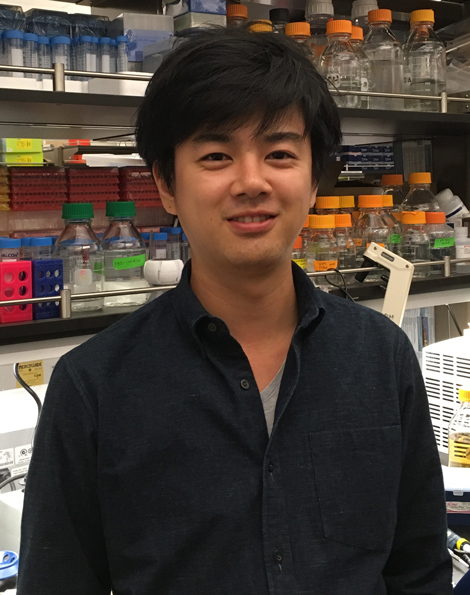
Reconnect: Kunitoshi Chiba
 "When Kunitoshi Chiba moved to the United States from his native Japan five years ago, he intended to pursue his studies in gene expression regulation. By February 2013 he had rotated in the renowned Berkeley labs of Robert Tijan and Michael Rape. But he was intrigued with the scientific question of how telomerase is regulated, a topic being studied in the brand-new lab of cell and developmental biologist Dirk Hockemeyer. Since then, Chiba’s scientific instinct has certainly paid off, as he has found himself on the front lines in an innovative research project that has created plenty of buzz in scientific journals.
"When Kunitoshi Chiba moved to the United States from his native Japan five years ago, he intended to pursue his studies in gene expression regulation. By February 2013 he had rotated in the renowned Berkeley labs of Robert Tijan and Michael Rape. But he was intrigued with the scientific question of how telomerase is regulated, a topic being studied in the brand-new lab of cell and developmental biologist Dirk Hockemeyer. Since then, Chiba’s scientific instinct has certainly paid off, as he has found himself on the front lines in an innovative research project that has created plenty of buzz in scientific journals.
“The Hockemeyer lab has great technology to tackle this problem, using human embryonic stem cells and genome editing,” he says. He was also attracted to the fact that Hockemeyer was a new principal investigator, and figured he could play a greater role in helping to establish the lab.
With a team of other researchers, Chiba has been seeking to understand transcriptional regulation of telomerase in human pluripotent stem cells. As he pursues his PhD in molecular biology, he has been supported by the Cancer Research Coordinating Committee Fellowship and the Nakajima Foundation fellowship. “Getting a fellowship is not just about financial support, but it’s also a confirmation of being on the right track,” he explains. “To really excel in this field, I need to propose the best possible ideas and publish great papers, which will allow me to obtain sustained funding in the future.” And he’s been doing just that: in the past two years, Chiba has been first author on three papers and one review in such publications as Science, eLife, Molecular and Cellular Biology, and Methods in Molecular Biology.
“When Chiba came to us, he had already worked at the Tokyo Institute of Technology and Columbia University and published a paper from this work,” says Hockemeyer. “He brought his own funding from Japan, and his English was exceptionally good. The only surprise was that he wanted to join my lab, because I had just started it — he was my very first PhD student.”
Born and raised in Fujisawa, Chiba received his Master in Science degree from the Tokyo Institute of Technology. He marvels at the diversity of people and cultures here. But the quality of research is anything but laid-back, he says. “At a world-renowned institution like Berkeley, you have access to the newest technology and research,” which encourages new ideas in his own pursuits.
Chiba’s future plans include being an independent scientist, exploring different biological topics and different aspects of cancer biology. “Ultimately, I want to find new solutions to problems not yet solved,” he says. Clearly, he’s already well on his way.




